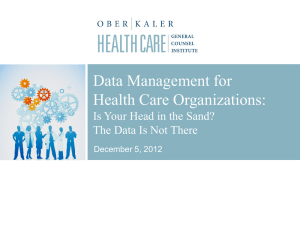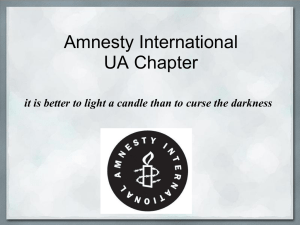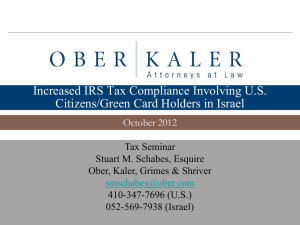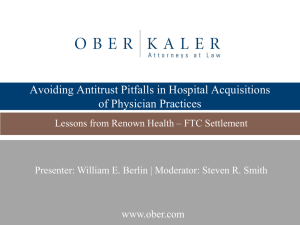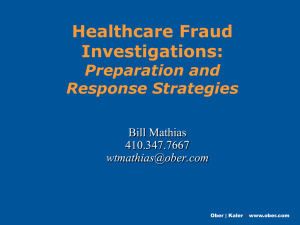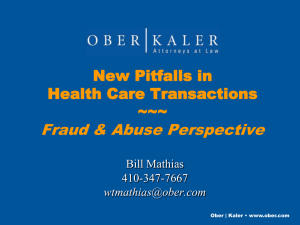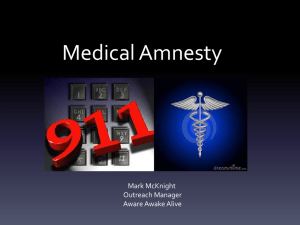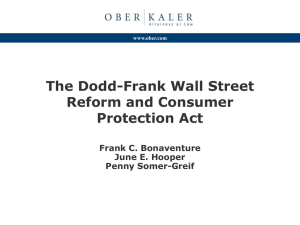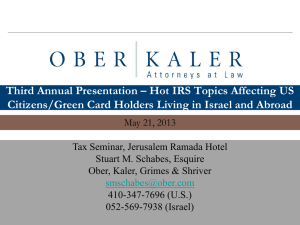View as PowerPoint Presentation
advertisement
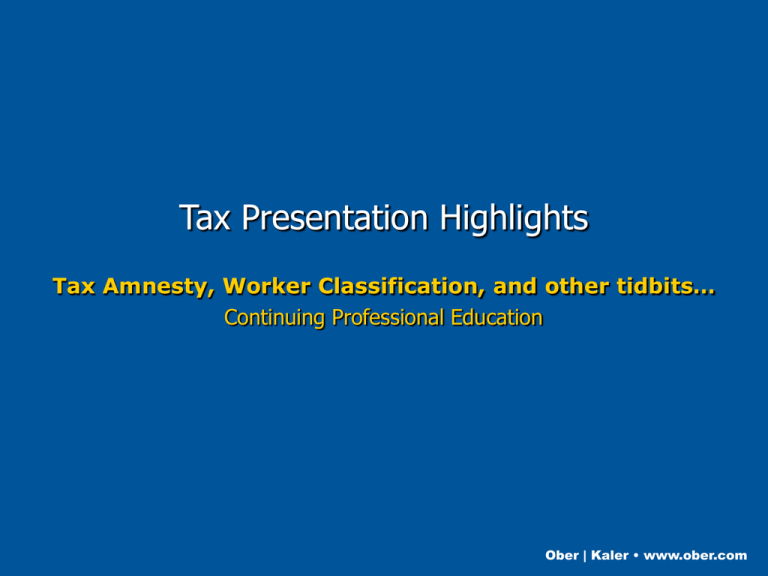
Tax Presentation Highlights Tax Amnesty, Worker Classification, and other tidbits… Continuing Professional Education Ober | Kaler • www.ober.com Presenter: Seth Kossman, Esquire 410-347-7695 skossman@ober.com Ober | Kaler • www.ober.com Tax Amnesty The states need your money NOW Ober | Kaler • www.ober.com Tax Amnesty A. Different Meanings – in Different States – and at Different Times B. Current Amnesties Ober | Kaler • www.ober.com State Tax Amnesty Programs Benefits Minimize/Abate Interest Minimize/Abate Penalties Limited Look-back Period Civil and Criminal Prosecution Ober | Kaler • www.ober.com State Tax Amnesty Programs Caution Not available to everyone Typically requires full payment in a short period of time May open a “can of worms” May exchange info with the IRS Must contact state first Ober | Kaler • www.ober.com States and Dates State Period Connecticut 5/1/09 – 6/25/09 Delaware 9/1/09 – 10/30/09 D.C. No current ending date Maryland 9/1/09 – 10/30/09 New Jersey 5/4/09 – 6/15/09 New York No current ending date Pennsylvania No current ending date Virginia Est. 10/1/09 (60-75 days) Ober | Kaler • www.ober.com Maryland Tax Amnesty Basics Amnesty Period: September 1 to October 30, 2009 Types of Taxes: individual taxes corporate income taxes withholding taxes sales and use taxes admissions and amusement taxes Applies to: Taxpayers who, on or before Dec. 31, 2008, failed to file a tax return OR pay the tax owed Ober | Kaler • www.ober.com Maryland Tax Amnesty Basics Continued Program Provides: The state will waive all civil penalties (except any previously assessed fraud penalties) The state will waive one-half of the interest levied Taxpayer Must: Pay the tax owed or enter into an installment agreement to pay the tax by Dec. 31, 2010 Ober | Kaler • www.ober.com Maryland Tax Amnesty Basics Continued Not for Everyone: Any business that, as of September 1, 2009, has more than 500 employees in the U.S. or is a member of a corporate group that does Any tax for which one was granted amnesty previously (i.e. as part of the 2001 program) Anyone who was eligible for the amnesty that Maryland allowed in 2004 regarding Delaware holding companies No amnesty for returns due after December 31, 2008 (ex. the December 2008 SUT return, which was due on January 20, 2009). To qualify, returns must be due on or before December 31, 2008. Ober | Kaler • www.ober.com Maryland Tax Amnesty Basics Continued Pre-September 1: The Comptroller’s office will not accept any applications before or after the deadline Advertising: The State expects to receive millions of dollars of tax revenue through the amnesty program, yet, the legislature has not authorized any funding for advertising the program Work in Progress: The Comptroller’s office is still working on the relevant procedures for the amnesty program The amnesty application will be online August 14 www.marylandtaxes.com Ober | Kaler • www.ober.com Maryland Tax Amnesty Take Note: • If you require an Installment Agreement, at least 10% of the amnesty amount due must be paid with the application. • File amnesty applications as early as possible after September 1… in case the state discovers a discrepancy in your application and your application is not considered to be completed by the due date. • Any payment made before September 1 will NOT be eligible for amnesty. • Any payment made before September 1 will be applied to penalties, interest, then tax, in accordance with statutory requirements. • If all that is owed is accrued penalties and interest (i.e. no outstanding tax liability), then amnesty will not apply. • No refunds and/or credit will be granted for interest and penalties paid prior to the amnesty period (even if paid on taxes which are eligible for amnesty). Ober | Kaler • www.ober.com Maryland Tax Amnesty Take Note: • A non-filer will only have amnesty for those periods listed on the amnesty application. – For example, if the non-filer has not filed for 15 years, but can only file accurate returns for 10 years, the non-filer should fill out the application with respect to those 10 years and file the returns with the application. Amnesty will apply to those periods listed on the application. Periods not listed on the application will not be eligible for amnesty. • The MD Amnesty program does not provide for a specific look-back period. • If a client currently has a deferred payment arrangement with the Comptroller, he can still apply for amnesty. – However, no previous payments made will be reallocated, but the deferred payment can be established for existing liabilities and adjusted for the waiver of one-half the interest and penalties. This will be calculated on the amount owed at the time of the application. Ober | Kaler • www.ober.com Maryland Tax Amnesty Will your client’s tax return information be disclosed to the IRS? To the extent information received under the program is subject to the Comptroller’s exchange agreement with the IRS, the information will be disclosed. Nevertheless, the disclosure of much of the information received under Amnesty may not result in a corresponding federal tax liability because: Taxpayers may have filed federal tax returns, but failed to file all necessary state tax returns. Many of the taxes eligible for amnesty have no comparable federal tax (ex. Sales Tax). Maryland tax law differs from federal tax law in some important aspects (ex. municipal bonds, different states of residency). Ober | Kaler • www.ober.com Maryland Tax Amnesty • If you have any questions regarding your client’s tax liability or eligibility for amnesty, email the Comptroller’s office at amnesty@comp.state.md.us or call 1-800-MD TAXES. Ober | Kaler • www.ober.com Workplace Fraud Act of 2009 and the Joint Enforcement Task Force (effective October 1, 2009) Ober | Kaler • www.ober.com Workplace Fraud Act of 2009 Why does the State care? Reality: Political agenda rewarding the major union constituency State / Union Talking Points: When an employer fails to properly classify workers as "employees," the employer avoids paying their share of: payroll taxes, unemployment insurance taxes, and workers' compensation premiums It puts competitors at a disadvantage because they have to cover the unpaid costs of those who cheat It deprives the general fund and the Unemployment Insurance Trust Fund of critical revenues It denies workers access to protections only guaranteed to employees Ober | Kaler • www.ober.com Workplace Fraud Act of 2009 Possible Harm Caused by this Act The Act may drive many businesses out of MD into neighboring states Enforcement costs may exceed additional revenue generated by the Act Ober | Kaler • www.ober.com Workplace Fraud Act of 2009 ABC Test Maryland uses the “ABC test” to determine whether a worker is an employee or an independent contractor. The ABC test is a three pronged test, under which an employer-employee relationship is presumed unless the individual performing the work is an exempt person or the employer demonstrates that: A. The individual is free from control and direction; B. The individual customarily is engaged in an independent business of the same nature; and C. The work is outside of the usual course of business of the employer or performed outside of any place of business of the employer. Work is "outside the usual course of business" if the individual: 1) performs the work off the employer's premises; 2) performs work that is not integrated into the employer's operation; or 3) performs work unrelated to the employer's business Ober | Kaler • www.ober.com Workplace Fraud Act of 2009 Federal Test - The IRS uses the Common Law Rules Facts that provide evidence of the degree of control and independence fall into three categories: Behavioral: Does the company control or have the right to control what the worker does and how the worker does his or her job? Illustrative factors include instructions & training provided by the company Financial: Are the business aspects of the worker’s job controlled by the payer? Illustrative factors include how worker is paid, whether expenses are reimbursed, who provides tools/supplies, did the worker make a significant investment in the company, whether there is an opportunity for profit or loss Type of Relationship: Are there written contracts or employee type benefits? Illustrative factors include whether there is a company pension plan, employee benefits, insurance, vacation pay, intent of parties/written contracts Businesses must weigh all these factors when determining whether a worker is an employee or independent contractor. There is no “magic” or set number of factors that “makes” the worker an employee or an independent contractor, and no one factor stands alone in making this determination. Ober | Kaler • www.ober.com Workplace Fraud Act of 2009 Enforcement Commissioner of Labor and Industry has legal authority to investigate workplace fraud in the construction and landscaping industries. The Commissioner may: 1) enter the employer's place of business (or worksite) for purposes of investigation; 2) require the production of records; 3) issue subpoenas for records and testimony; and 4) pursue judicial relief and the assessment of fines for an employer's failure to comply The State's UI division investigates employee classification through both random and targeted audits and when a person claims UI benefits but is not listed as a covered employee. Ober | Kaler • www.ober.com Workplace Fraud Act of 2009 Penalties Current Law - no penalties for misclassification. New law - allows an employer who misclassifies an employee, but does not do so knowingly, to come into compliance within 45 days without penalty. If an employer does nothing to comply in the required time period, a penalty of up to $1,000 per misclassified employee may be imposed. Employers who "knowingly" misclassify employees, however, may be subject to a penalty of up to $5,000 per misclassified employee. An employer may be assessed up to double the $5,000 penalty if it has previously been found in violation by a final order of a court or administrative unit. An employer in violation three or more times may be assessed up to $20,000 per misclassified employee. Ober | Kaler • www.ober.com Workplace Fraud Act of 2009 Mistake vs. Knowing Violation A misclassification that is not found to be "knowing" will not result in a penalty; however, the employer will be required to come into compliance. “Knowingly” requires actual knowledge, deliberate ignorance or reckless disregard for the truth. Factors include whether the employer sought, prior to hiring the employee, documentation showing: 1) a sole proprietor's reporting of business income and losses on his personal income tax returns; 2) an independent contractor's withholding of payroll taxes and payment of unemployment insurance contributions and worker's compensation premiums on behalf of all individuals working for him; and 3) the employer provided written notice to individuals of their status or classification and all implications of that status or classification. The State bears the burden of proving a knowing violation. Ober | Kaler • www.ober.com
